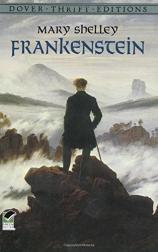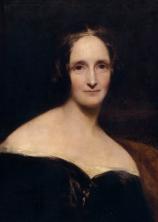Reading Group Guide
Discussion Questions
Frankenstein

(Chapter/Passage-specific. Overarching/thematic questions below.)
Letters
1. Is Walton a reliable narrator? Why or why not?
2. Is Walton’s goal to “confer on all mankind . . . a passage near the pole” noble or overly ambitious?
3. How does Robert’s desire for a friend affect his relationship with Dr. Frankenstein? How might this relationship affect the reader’s trust in Walton as a reliable narrator?
Chapters 1-2
1. How does Victor’s statement that “the world was to me a secret which I desired to divine” serve as characterization?
2. How do Henry and Victor differ? Why might Shelley be setting them up as character foils?
3. What is Shelley’s intent when she has Victor characterize Elizabeth as “the saintly soul (who) shone like a shrine-dedicated lamp in our peaceful home?” What role does this characterization set for Elizabeth?
4. Is Victor’s fascination with the Philosopher’s Stone an admirable one?
Chapters 3-5
1. Victor’s obsession with natural science results in two years passing with no visits home. How would you evaluate his character at this point?
2. Describe the shift in tone when Victor says, “Learn from me, if not by my precepts, at least by my example, how dangerous is the acquirement of knowledge and how much happier the man is who believes his native town to be the world, than he who aspires to become greater than his nature will allow.”
3. During his summer experiment, Victor admits “his eyes were insensible to the charms of nature.” What role might nature (or the lack of it) play for Victor?
4. What message might Victor be missing when he dreams that his kiss turns Elizabeth into a corpse?
Chapters 6-10
1. Who is at fault for William’s death? Is anyone other than the murderer responsible for what happened?
2. How might Justine’s trial have differed in today’s court system?
3. How does Victor’s guilt affect his health? What is Shelley’s purpose in this recurring plot device?
4. How is Victor’s reaction toward the Valley of Chamounix a departure from his previous views of nature?
Chapters 11-16
1. What imagery does Shelley employ when the character describes his “awakening?” What does his reaction remind you of?
2. How does the change in narration to the creature’s point of view affect the reading of the novel? Do you feel sympathy for the creature when he is rejected by humanity?
3. What crucial role in the creature’s development is played by the DeLacey family?
4. What is the motivation behind the creature’s vow of “eternal hatred and vengeance to all mankind?”
Chapters 17-24
1. Is the creature’s demand for a female companion a valid request? Examine the pros and cons of Victor’s compliance. Consider evidence provided by both Victor and the creature.
2. To what famous Romantic symbol is Shelley alluding when she has Victor think, “Could I enter into a festival with this deadly weight yet hanging round my neck and bowing me to the ground?”
3. What is Victor’s greatest fear as he leaves for England? Describe the irony in his decision to continue.
4. What evidence suggests Victor feels responsibility for the murders? What evidence illustrates that he still blames the creature?
5. How is Victor’s view of the Scottish Orkneys a reflection of his emotional state?
6. After watching his female companion torn to bits, the creature makes an eloquent defense and vows Victor will “repent of the injuries (he) inflicts.” Is the creature justified in his feelings? Why or why not? What is Shelley’s purpose in his defense?
7. After hearing of Clerval’s murder, Victor falls ill once again. In agony, he wonders, “Why did I not die?” What would your answer be? Is there a reason for his continued anguish?
8. For Victor and his father, what purpose would a quick marriage to Elizabeth serve? Discuss the impact on Elizabeth. What role does she continue to play? Does her death alter or perpetuate that role?
9. Discuss the irony in Victor’s statement to the magistrate: “Man, how ignorant art thou in thy pride of wisdom!”
10. What is the motivation behind Victor’s vow to find and destroy his creature? Has he learned any lessons?
Letters
1. What is the purpose of Shelley’s irony when Walton recognizes he has found the friend he is looking for only to watch him die?
2. When Walton listens to his men and turns his ship homeward rather than risk their lives, is he accurate in his statement that he has “lost (his) hopes for glory?” Explain.
3. Why does the creature choose to die at the end of the novel? What does his choice suggest about his connection to Frankenstein?
Overarching
1. The horror story is just as popular today as it was in Shelley’s early nineteenth century England. What is the appeal of this genre? Discuss elements from Frankenstein that parallel characteristics of modern horror tales such as Stephen King’s, or contemporary films such as Nightmare on Elm Street. What are the effects of these elements on the audience, and how might that explain our fascination?
2. Dr. Frankenstein finds himself unable to “mother” the being he creates. Why does Shelley characterize Victor in this way? What does this choice say about the role of women during Shelley’s era? Discuss the significance of parent-child relationships and birth references throughout the novel.
3. Dreams and nightmares play a recurrent role throughout Shelley’s novel. Trace the use of dreams throughout the book, with emphasis on how they relate to changes in Victor’s character.
4. Why are there so many references to sickness and fever in Frankenstein? Trace these references throughout the novel. What broader theme might Shelley be expressing?
5. Re-visit some of your pre-reading activities, such as the journal entry on the “Philosopher’s Stone” and the anticipation guide on parenting. Now that you have completed Frankenstein, have your views changed? Why or why not?
6. Ice is a prevalent image and an integral plot device in Shelley’s Frankenstein. How is it appropriate that the novel ends in ice? What is the symbolism of ice for the characters and the story?
7. In his afterword in the Signet Classics edition of Frankenstein, Harold Bloom asserts that “all Romantic horrors are diseases of excessive consciousness, of the self unable to bear the self.” Does this Romantic characteristic apply to Victor and his treatment of the creature? Explain. Consider the fact that Victor never gives the creature a name.
8. Place Frankenstein’s creature in modern times. Suppose he had a family that raises him, includes him, and even enrolls him in school. How might today’s society treat Victor’s creature differently? How would it mimic the time period of the novel?
9. Consider the character of Justine Moritz. While her story only takes two chapters of Shelley’s novel, her role as a secondary character is significant. What is Shelley’s purpose in telling Justine’s story? What truths about her time is Shelley revealing?
10. The patriarchal society of Frankenstein is one in which men pursue their goals against hopeless odds. In light of this work ethic, is Robert Walton a failure when he turns his ship around at the end of the novel? How would Victor Frankenstein answer this question? What would Mary Shelley say? What do you think?








